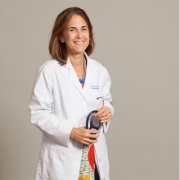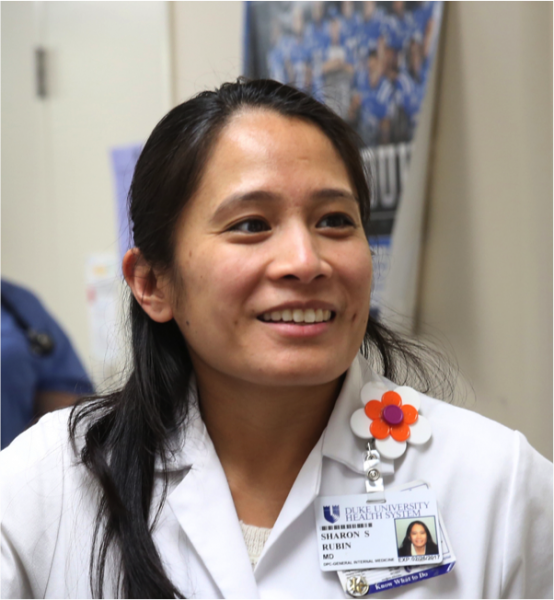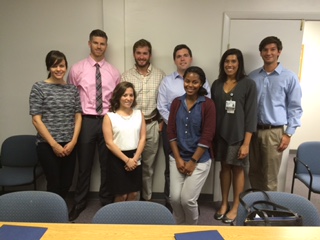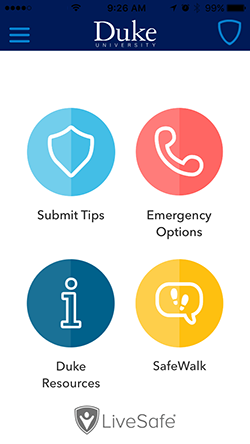From the Director

Happy second week of July! I am hearing lots of compliments about everyone's great work and support of their teams.
We are all keeping quite busy this summer - rising SARs are certifying fellowship applications this week, our "first semester" travelers are heading to their global health rotations, interns are settling in, and noon conference attendance has been excellent!
Kudos this week to Zach Wegermann and Drew DeMaio for outstanding SAR talks, and to Meg Steiner for her fantastic chairs conference! Way to kick off the year. Also to Jenn Rymer for her tremendously good grand rounds. Thanks to the Chiefs for the "pager board" at noon conference - they are busy returning pages so you guys can sit back and listen to the speakers. Seems to be going well - don't forget to drop off your pager. Kudos alos to our residency program award winners:
- Fellow Teaching Award - Ajar Kochar
- Stead Teaching Award - Cara O'Brien and Peter Kussin
- Outstanding Service Award - Jan Dillard
- McClellan Award - Jenn Rymer
Please take a look at the calendar ... We have several events coming up so hope to see you there.
Have a great week!
Aimee
What Did I Read This Week?

Ms. Tia Williams
Everyone has situations in which they may find that it is difficult to communicate. Being able to communicate effectively is definitely important in our personal and professional lives. It is important that we improve our written communication skills and also enhance our ability to be comfortable speaking with others. It is a good idea to assess your interpersonal skills in an effort to help build better relationships by improving them in your personal and professional life.
The assessment that I used to analyze my communication skills was an interpersonal skills assessment test on www.skillsyouneed.com. The skills assessment test focused on listening skills, emotional intelligence, verbal communication and communication in groups. Communication is an art and it should be developed throughout the career of clinicians (Warnecke 2014). We have to develop our art and good planning and practice of these skills can help us to avoid misunderstanding and confrontations later on. “The ability to communicate information accurately, clearly and as intended, is a vital life skill and something that should not be overlooked. It’s never too late to work on your communication skills and by doing so improve your quality of life” (http://www.skillsyouneed.com/general/communication-skills.html).
The results of my skills assessment test based on my responses to the questions reflected that I have above average interpersonal skills. My overall score was 71%. This implied that I have good interpersonal skills; however improvement is always beneficial to the success of building good relationships with people at work, home and in my social encounters. I scored a 60% on the listening skills assessment which is average.
It is imperative that certain guidelines or skills are used to be an effective communicator and to build the best possible relationships. It is important that we realize that we are required to be speakers as well as listeners because communication is a two-way street. In order to receive the information clearly the message must be expressed by the sender in a manner in which it can be fully understood and interpreted without any qualms. Rane (2011) stated the “lack of good listening skills can create embarrassing situations which lead to misunderstanding and lack of coordination (p 45). This is certainly a skill that I have been working on and it would be beneficial to me if I can accomplish my goal of becoming a good listener. I am quick to respond which can cause a misunderstanding of the message that is being sent. If they are not allowed sufficient time to compete their thought or sentence before they are interjected, it can be seen as disrespectful and also discouraging which can ultimately effect the report you have with the physician or patient. You want to be confident, but not arrogant to avoid any gaps in communication. In order to be empathetic and to express to others that you understand their situation and actively would like to provide the best possible experience for them it is important that you hone in on the concept of good active listening skills.
Working in the medical field for 10 plus years, I have certainly found that communication is an important part of my job; and of course the physicians and other hospital staff that deal with each other and patients on a daily basis. The manner in which things are communicated obviously effect the overall outcome of care received by the patients. Warnecke (2014) pointed out that communication is an art and it should be developed throughout the career of clinicians. Patients and their families thrive from the therapeutic relationships that they build with their doctors as well as the nurses and other clinical staff that come into contact with them. Warnecke (2014) stated “patients frequently experience psychological distress and require empathy and highly skilled communication (p 156). It is not always easy to inform patients and their families about health conditions or diagnosis that can affect them for the remainder of their lives. Therefore it is important that it is approached as delicate and empathetic as possible most times. There are several skills that are required by everyone involved when it comes down to communicating effectively. The absence of effective communication or negative communication can certainly cause problems in the medical field. The patients as well as their family members react off of the vibes from the nonverbal and verbal cues from the physician and staff. If they are not able to feel the comfort and compassion of their physician and other clinical staff during their most vulnerable time as a patient in the hospital, the likelihood of a bad experience and or outcome is highly expected. Therefore it is important that physicians and all hospital staff members show some key communication tactics in dealing with people in this environment. Verbal and nonverbal cues such as body language, movements, eye contact, empathy and certainly good active listening skills are crucial.
Again, communication is an art, work diligently to master it and it will benefit you and your patients in the long run.
References:
Warneke, E, (2014). The art of communication. Australian Family Physician Vol 43. No.3, 156-158.
http://www.skillsyouneed.com/general/communication-skills.html
Clinic Corner

We welcome our 8 new interns to Pickett Road this month. We are already orienting them to the clinic and making the change over from the graduating SARS to the new interns. Our new JARS have increased number for patients from 5-6 and new SARs are at 7 patients a session. We welcome new Alicia Bradley are our new LPN, Lavasia Hall our new PSA, and Devona Price CMA.

Pickett Road has started extended hours for the attendings. Pickett will be open to seeing patients from 7 am to 6pm. This does not affect the residents. We hope this will improve the patient experience and improve access to our providers. We have also implemented holding frozen slots for the attendings so patients can call the day of visit for an acute appointment. Referrals have been revamped and new referrals have been added to EPIC to help assist patients.
Sincerely
Sharon Rubin, MD, FACP
Assistant Professor, Duke University Medical Center
Residency Director at Pickett Road
QI Corner
Please join us for the first meeting of the Patient Safety and Quality Council (PSQC)!
Next Tuesday, July 19th at 7:00pm
(Location TBD – making final arrangements today)
This is a resident committee with resident-driven goals and projects. It's YOUR chance to get involved! We will meet monthly, usually luring you with food. As a group, we'll select projects at the beginning of the year, and then work together to follow them through.
At this first meeting, we'll eat, drink, review some of last years’ work (including discussing what is left to be done/opportunities to get involved) and brainstorm project ideas. If you want to be involved but you can't make it to the kick-off, email matt.atkins@duke.edu or alicia.clark@duke.edu with your scheduling preferences.
From the Chief Residents
Grand Rounds
Friday, July 15 - Chris Granger, Cardiology (Trent Semans)
Noon Conference
| Date | Topic | Lecturer | Time | Vendor | |
| 7/11/16 |
SAR Lecture Series: Acute/Decompensated Heart Failure |
Taylor Bazemore |
12:00 | Domino's | |
| 7/12/16 |
SAR Lecture Series: Acute Hypoxic Respiratory Failure |
Kara Wegerman |
12:00 | Nosh | |
| 7/13/16 |
SAR Lecture Series: Hypercarbic Respiratory Failure |
Christine Bates |
12:00 | China King | |
| 7/14/16 |
SAR Lecture Series: Tachyarrhythmias |
Adam Barnett |
12:00 | Chick Fil A | |
| 7/15/16 |
Chair's Conference |
Annie Reihman |
12:00 | Jason's Deli |
From the Residency Office
Have You Logged Your Duty Hours??
With the start of the 2016-17 academic year, the residency program is asking all house staff to log their duty hours on a daily basis. This will allow us even closer oversight of duty hour compliance across the program. In order to use the MedHub mobile Duty Hour app, you will need to know your actual MedHub log in as it will not accept your NetID/password log in. If you have forgotten you main log in, please go to the main MedHub site, and select "Forgot my password." You will then be able to re-set it via email. Lynsey Michnowicz will be sending reminders each Wednesday to those who have not yet logged their duty hours for the week. Thank you in advance for your attention to this task!
NCSP Applications
The National Clinician Scholars Program (NCSP), a two-year research training fellowship (formerly known as the Robert Wood Johnson Foundation Clinical Scholars Program) for physicians and nurses, is now accepting applications for enrollment in July 2017. The NCSP provides mentored training in clinical, community, and health policy research, with a focus on supporting the development of change agents who will devote their careers to leading improvements in health and healthcare.
The NCSP, in partnership with the Department of Veterans Affairs, currently has training sites at the University of California at Los Angeles, University of Michigan, University of Pennsylvania, and Yale University.
Applications are due August 15th.
Office Hours for Dr. Zaas
Dr. Zaas will have the following office hours. Please feel free to stop by during these times and of course always feel free to reach out to her office to set up a meeting outside of these times if needed!
Monday - 3:00 p.m. to 4:00 p.m.
Thursday 10:00 a.m. to 11:00 a.m.
Next Book Club Event!
Attention, Medicine Residents!
Welcome to the new academic year, and a particularly warm welcome to our new interns! We're excited to announce that the Duke Internal Medicine book club is back! Our first event will be on Thursday, August 18th from 5:30 - 7:30 pm in the Searle Center Faculty Lounge. At the request of the residents (that's you!), our structure is changing a bit. This time we'll be reading All the Light We Cannot See by Anthony Doerr, a NYT best seller and winner of the 2015 Pulitzer Prize for Fiction. Books are available at most local book stores or online. Snacks and drinks will be provided.
If you're interested in attending, or if you have any questions, please RSVP to me at laura.caputo@duke.edu. We're looking forward to seeing you there!
LiveSafe Mobile App

Duke is introducing a new mobile app called LiveSafe to put a powerful safety tool in the hands of the Duke community.
The app, available as a free download from Apple and Android app stores, enables smartphone users to submit real-time tips to Duke Police, virtually “SafeWalk” friends and family while traveling, place emergency calls, and access important resources for support.
You can find more information, including instructions on how to download the free app, on the DukeALERT website: http://emergency.duke.edu/notified/livesafe.
Opportunities for Wellness
Feeling down? Need to talk to someone?
All trainees at Duke have FREE access to Personal Assistance Services (PAS), which is the faculty/employee assistance program of Duke University. The staff of licensed professionals offer confidential assessment, short-term counseling, and referrals to help resolve a range of personal, work, and family problems. PAS services are available free of charge to Duke faculty and staff, and their immediate family members. An appointment to meet with a PAS counselor may be arranged by calling the PAS office at 919-416-1PAS (919-416-1727), Monday through Friday between 8:00 A.M. and 5:00 P.M. For assistance after hours, residents and fellows can call the Blood and Body Fluid Hotline (115 inside DUH, 919-684-1115 outside) for referral to behavioral health resources. Another resource is Duke Outpatient Psychiatry Referrals at (919) 684-0100 or 1-888-ASK-DUKE.
https://www.hr.duke.edu/pas/
Upcoming Dates and Events
July 29 - Summer Celebration @ The Home of Dr. Zaas
August 31 - Stead Trivia Night
October 8 - Stead Tread
Useful links
GME Mistreatment Reporting Site
https://intranet.dm.duke.edu/influenza/SitePages/Home.aspx
http://duke.exitcareoncall.com/
Main Internal Medicine Residency website
Main Curriculum website
Department of Medicine
Confidential Comment Line Note: ALL submissions are strictly confidential unless you chose to complete the optional section requesting a response
Opportunities
https://www.phs.wakehealth.edu/public/edu.cfm
www.bidmc.org/CentersandDepartments/Departments/BIDHC
http://www.careermd.com/employers/latestbulletins.aspx